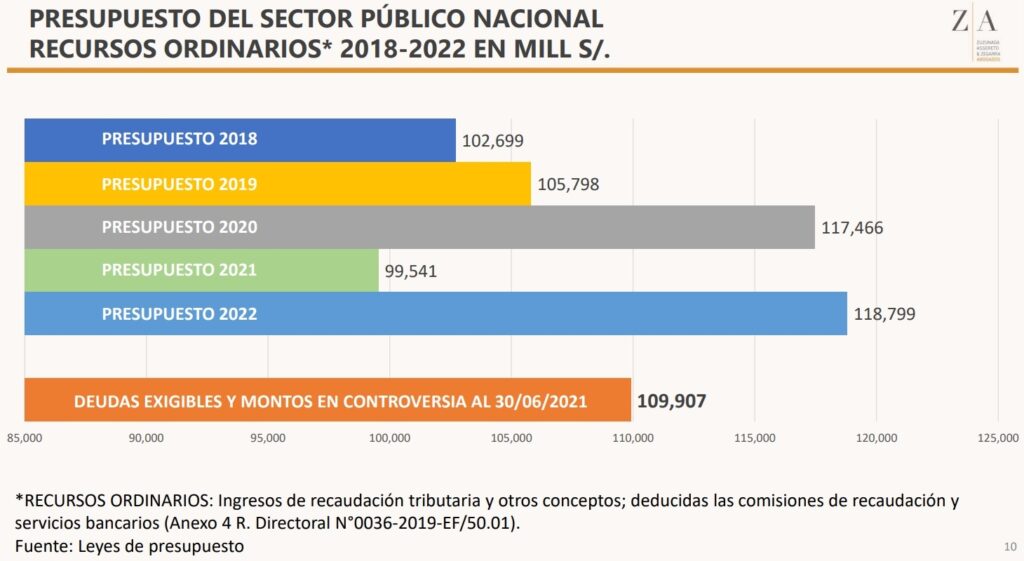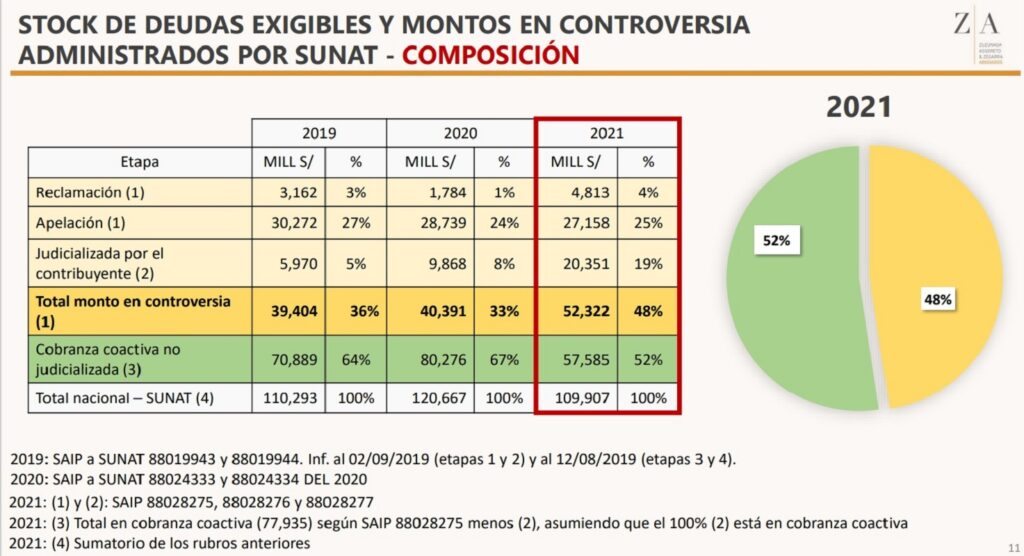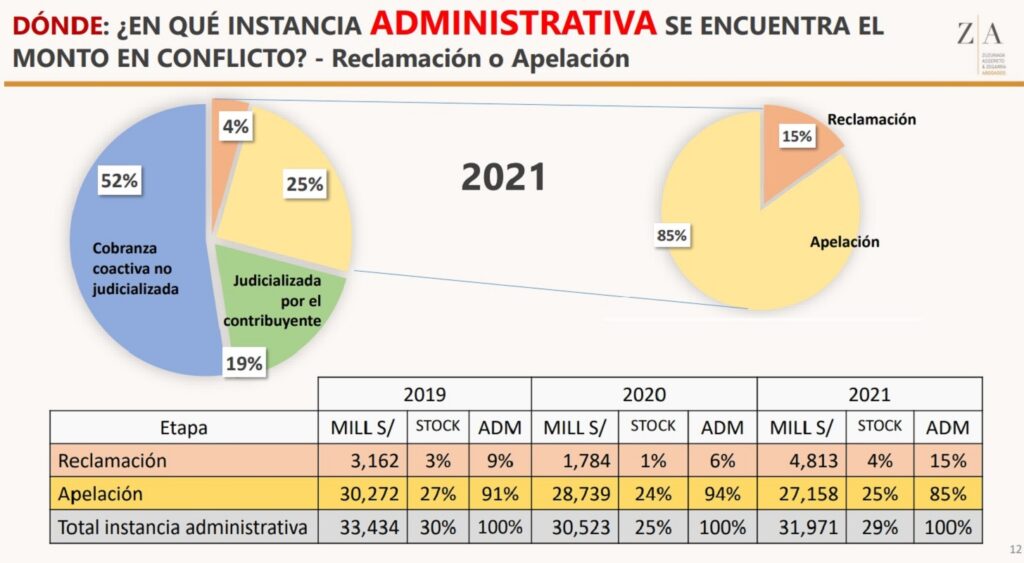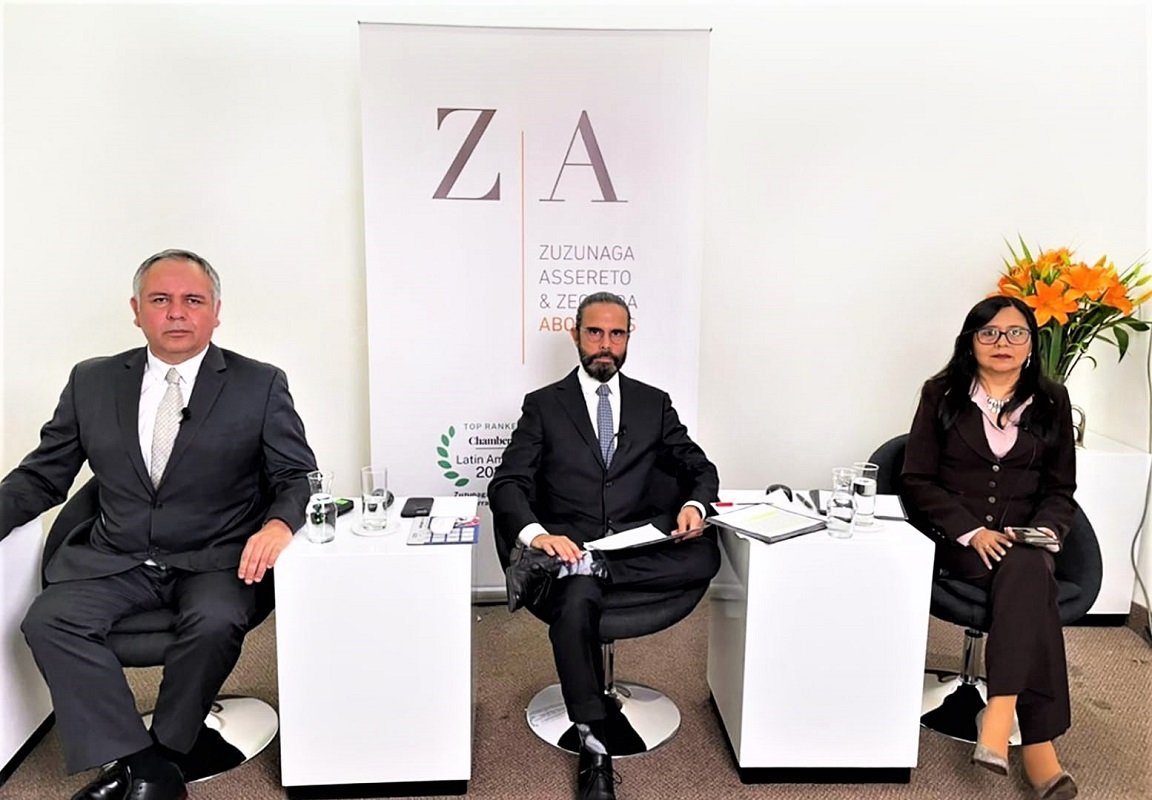Agencia Peruana de Noticias PRENSAPERU.PE https://prensaperu.pe Twitter: @prensaperupe Con la finalidad de absolver interrogantes de los contribuyentes peruanos al verse envueltos en un conflicto con la Superintendencia Nacional de Aduanas y de Administración Tributaria (SUNAT), la firma de abogados Zuzunaga, Assereto & Zegarra Abogados (Z&A), organizó el evento virtual “Mitos y verdades sobre los conflictos tributarios: Cuánto demoran, quién gana y cuánto está en juego”.
Este es el tercer año consecutivo que la firma presenta el estudio “Conflictividad Tributaria en Cifras Z&A” mostrando, en este Reporte 2021, la realidad de las controversias tributarias en nuestro país. Así, quedó en evidencia el monto total que se discute en estos conflictos, los resultados obtenidos en las distintas instancias y los tiempos de demora.

Fernando Zuzunaga, socio del Estudio Zuzunaga, Assereto & Zegarra Abogados indicó que del total del stock de expectativa de deuda que maneja SUNAT a junio del 2021 ascendente a 110 mil millones, “los montos en controversia administrativa en manos de la SUNAT y Tribunal Fiscal están alrededor de 31 mil millones de soles, lo que es una constante desde hace años. A diferencia de ello se advierte que hay mayor litigiosidad en el Poder Judicial (Deudas judicializadas por el contribuyente) con un monto aproximado de 20 mil millones, habiendo aumentado de un 8% a un 19% dentro de la composición del stock. Por último, en cuanto a las deudas exigibles coactivamente se observa un mejor manejo de ellas ya que se redujeron a 57 mil millones, habiendo bajado su participación en el stock de un 67% a un 52% que siguen siendo un monto exorbitante, esto entre el 2020 al 2021”
Además, agregó que si tenemos en cuenta que el presupuesto de nuestro país de los últimos años (salvo el 2020 por razones obvias) en cuanto a recursos ordinarios asciende a poco más de 100 mil millones, entonces ese stock de deuda de 110 mil millones representaría un año de ingresos fiscales.

Por su parte, Socorro Núñez, Directora del Estudio Zuzunaga, Assereto & Zegarra Abogados, resaltó que “si bien la controversia tributaria en la etapa administrativa se mantiene en alrededor de 30 mil millones de soles de modo constante, encontramos algunos cambios en su composición. Así, en el 2021 el 15% está en instancia de reclamación y el 85% en apelación, en cambio, en el 2020 teníamos solo el 6% en reclamación y el 94% en apelación”. Además, señaló “Que, si bien en la primera instancia administrativa a cargo de la SUNAT no hay demora en la resolución de los reclamos, sí llama la atención cómo se resuelven los mismos. En efecto, en el 2021 el 78% del monto reclamado se declaró INFUNDADO por la misma SUNAT. Es decir, se resuelve rápido pero casi todo se confirma, lo que hace necesario que el contribuyente acuda en apelación ante el Tribunal Fiscal.”
Asimismo, Lorgio Moreno, Socio de Z&A, mencionó que “del universo de casos en que la Corte Suprema modifica la Resolución del Tribunal Fiscal, el 75% es a favor de la SUNAT y el 25% a favor del contribuyente (…) la conclusión general es que el Tribunal Fiscal es el gran ganador a nivel global, pero si vemos a detalle, los procesos e intervenciones de estos dos actores, contribuyentes y SUNAT, este último cada vez que interpone una demanda tiene mayores posibilidades de éxito”

Fernando Zuzunaga, socio de Z&A, finalizó el evento destacando “Con el estudio podemos concluir que contamos con una SUNAT que, si bien gestiona eficientemente sus montos en controversia, porque resuelve dentro de los plazos, no se observa esa eficiencia en cuanto a sus decisiones como órgano resolutor de conflictos en las reclamaciones; tenemos un Tribunal Fiscal, donde se advierte imparcialidad y especialización en el 50% de casos de enmienda a la plana a la Sunat, pero no toma en cuenta al resolver su pasivo de 27 mil millones de soles, prolongando las controversias de montos por alrededor de 4 años; y con un Poder Judicial que tiende repetir los fallos del tribunal fiscal o dilatarlos, aunque en menor medida que en años anteriores, pero sigue siendo una constante”
El evento, en el que, además, se plantearon propuestas de solución y se sentó posición sobre el derecho de los contribuyentes a la Reserva Tributaria y el deber de transparencia de la administración, se realizó el 27 de octubre y contó con la participación de Fernando Zuzunaga y Lorgio Moreno, ambos socios de Z&A y Socorro Núñez, directora de la firma. Como panelista estuvo el ex Defensor del Pueblo Walter Albán Peralta, profesor principal del Departamento de Derecho en la Pontificia Universidad Católica del Perú.
Fuente: Agencia Peruana de Noticias PRENSAPERU.PE https://prensaperu.pe Twitter: @prensaperupe
English translation
Tax debt in the administrative stage amounts to more than 30 billion soles according to Sunat, Tax Court and Judicial Power.
Peruvian News Agency PRENSAPERU.PE https://prensaperu.pe Twitter: @prensaperupe In order to answer questions from Peruvian taxpayers when they are involved in a conflict with the National Superintendency of Customs and Tax Administration (SUNAT), the law firm Zuzunaga, Assereto & Zegarra Abogados (Z&A), organized the virtual event “Myths and truths about tax disputes: How long they take, who wins and how much is at stake.”
This is the third consecutive year that the firm presents the study “Tax Conflict in Z&A Figures” showing, in this 2021 Report, the reality of tax disputes in our country. Thus, the total amount that is discussed in these conflicts, the results obtained in the different instances and the delay times was made clear.

Fernando Zuzunaga, partner of the Estudio Zuzunaga, Assereto & Zegarra Abogados indicated that of the total debt expectation stock handled by SUNAT as of June 2021 amounting to 110 billion, “the amounts in administrative controversy in the hands of SUNAT and the Tax Court are around 31 billion soles, which has been a constant for years. In contrast to this, it is noted that there is greater litigation in the Judicial Power (Debts judicialized by the taxpayer) with an approximate amount of 20 billion, having increased from 8% to 19% within the composition of the stock. Finally, in terms of debts that are enforceable, a better management of them is observed since they were reduced to 57 billion, having lowered their participation in the stock from 67% to 52%, which is still an exorbitant amount, this between from 2020 to 2021 “
In addition, he added that if we take into account that the budget of our country in recent years (except 2020 for obvious reasons) in terms of ordinary resources amounts to just over 100 billion, then that stock of debt of 110 billion would represent one year of tax revenue.

For her part, Socorro Núñez, Director of the Zuzunaga, Assereto & Zegarra Abogados Law Firm, highlighted that “although the tax controversy in the administrative stage remains at around 30 billion soles on a constant basis, we find some changes in its composition. Thus, in 2021 15% are in the claim and 85% in appeal, on the other hand, in 2020 we had only 6% in claim and 94% in appeal ”. In addition, he pointed out “that, although in the first administrative instance in charge of the SUNAT there is no delay in the resolution of the claims, it is striking how they are resolved. Indeed, in 2021, 78% of the amount claimed was declared UNFUNDED by SUNAT itself. In other words, it is resolved quickly but almost everything is confirmed, which makes it necessary for the taxpayer to appeal to the Tax Court. “
Likewise, Lorgio Moreno, Partner of Z&A, mentioned that “of the universe of cases in which the Supreme Court modifies the Resolution of the Fiscal Court, 75% is in favor of SUNAT and 25% in favor of the taxpayer (…) the conclusion In general, the Tax Court is the big winner at the global level, but if we look in detail at the processes and interventions of these two actors, taxpayers and SUNAT, the latter each time it files a lawsuit, it has a greater chance of success “

Fernando Zuzunaga, partner of Z&A, ended the event by highlighting “With the study we can conclude that we have a SUNAT that, although it efficiently manages its amounts in controversy, because it resolves within the deadlines, this efficiency is not observed in terms of its decisions. as a body for resolving conflicts in claims; We have a Tax Court, where impartiality and specialization are observed in 50% of cases of amendment to the Sunat flat, but it does not take into account when resolving its liability of 27 billion soles, prolonging the controversies of amounts by around 4 years; and with a Judicial Power that tends to repeat the rulings of the tax court or delay them, although to a lesser extent than in previous years, but it remains a constant “
The event, in which, in addition, solution proposals were raised and a position was established on the taxpayers’ right to the Tax Reserve and the administration’s duty of transparency, was held on October 27 and had the participation of Fernando Zuzunaga and Lorgio Moreno, both partners of Z&A and Socorro Núñez, director of the firm. As a panelist there was the former Ombudsman Walter Albán Peralta, Senior Lecturer in the Department of Law at the Pontificia Universidad Católica del Perú.
Source: Peruvian News Agency PRENSAPERU.PE https://prensaperu.pe Twitter: @prensaperupe
